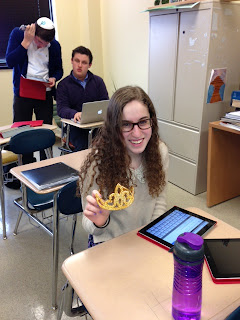 |
| The boys working on the Shakespeare Birthday Bash Game |
 |
| We dressed up for the day; this student wore this shirt to show the motif of rule and misrule in the play she studied this year, A Midsummer Night's Dream |
 |
| This student brought a crown to show the Elizabethan age |
And the winner is . . . Wait, before I announce the winner, let me just say that one of the boys said this was the "hardest" he's ever worked in class, and he feels like he knows all of Shakespeare's plays. How's that for "hard fun" (see Frank Moss' The Sorcerers and Their Apprentices) and a wild but still structured 40 minutes -- that also included donuts?
OK, so the winners were . . .
THE BOYS!
Here are their findings, all done on computers and iPads, in a 40-minute period:
Shakespeare Game: Boys
4/23/13
1) “Though this be madness there is method in’t”- Hamlet; Act 2, Scene 2, Line 203 (Polonius)
2) “Some are born great, some achieve greatness, and some have greatness thrust upon ‘em.”- Twelfth Night; Act 2, Scene 5, Line 144 (Malvolio)
CONTEXT: Malvolio is reading Maria’s fake letter, from Olivia
3) “ Out, out damned spot”- Macbeth’ Act 5, Scene 1, Line 35 (Lady Macbeth)
CONTEXT: Lady Macbeth, who was anxious about the murders she was responsible for, hallucinated that there was blood on her hands.
4) “This is very midsummer madness.”- Twelfth Night; Act 3, Scene 4, Line 56 (Olivia)
CONTEXT: Malvolio and Olivia are fighting
5) “ Friendship is constant in all other thing, save in the office and affairs of love. Therefore, all hearts in love use their own tongs; let every eye negotiate for itself, and trust no other agent.”- Much ado About nothing, Act 2, Scene 1, Line 158-162 (Claudio)
7) “Men at some times are masters of their fates, the fault dear brutus, is not in our stars, but in ourselves, that we are underlings” Julius Caesar, Act 1, Scene 2, Line 35 (CASSIUS)
8) “The poet’s eye in a fine frenzy rolling.” Midsummer Nights Dream, Act 5, Scene 1 (Theseus)
CONTEXT: Hippolyta is taunting Theusus about his “Lover”
9) “Life is but a walking shadow.”- Macbeth, Act 5, Scene 5, Line 24(Macbeth)
CONTEXT: It means that there is no originality left in life.
10) “If I be waspish, best beware my sting.”- Taming of the shrew; Act 1, scene 10, line 1,059 (Katherina)
11) “Ay me! for aught that ever I could read, Could ever hear by tale or history, The course of true love never did run smooth.”- Midsummer nights dream; Act 1, Scene 1, Line 132 (Lysander)
12) What a piece of work is a man! How noble in reason! How infinite in faculties! In form and moving, how express and admirable! In action how like an angel, in apprehension how like a god. The beauty of the world, the paragon of animals. And, yet to me, what is this quintessence of dust? – Hamlet; Act 2, scene 2, Line 1397(Hamlet)
